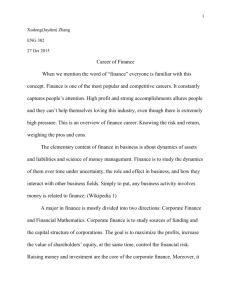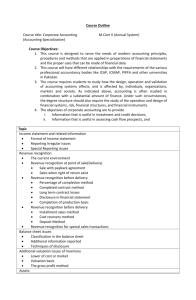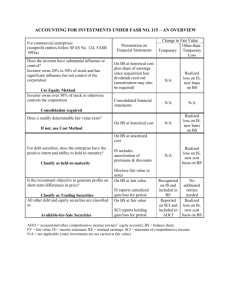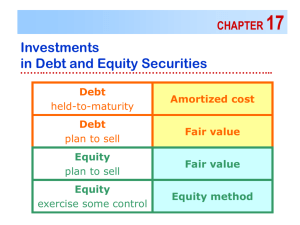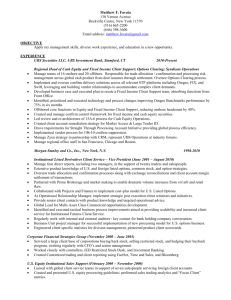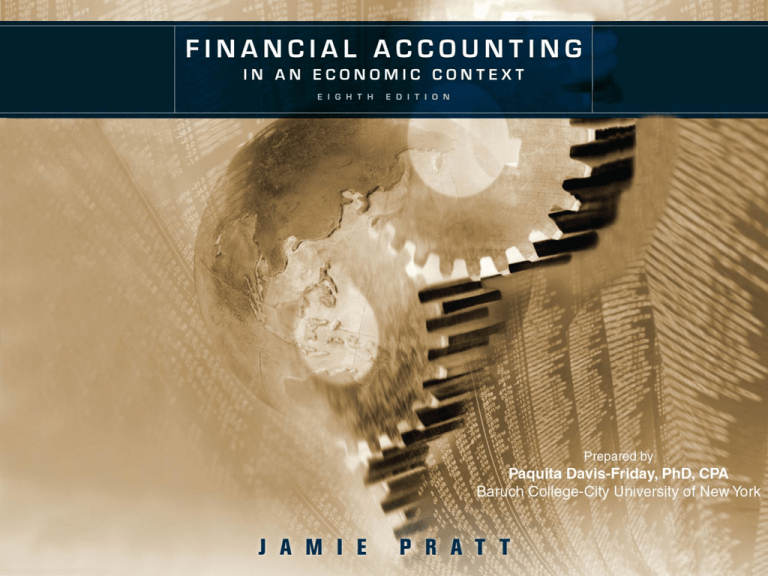
1
Chapter 8:
Investments in Equity Securities
2
Equity Securities Classified as Current
Two
criteria must be met for an investment in a
security to be considered current and thus
warrant inclusion as a current asset:
1. The investment must be readily marketable.
2. Management must intend to convert the
investment into cash within the time period of
current assets (one year or the operating cycle,
whichever is longer).
3
Trading and Available-for-Sale Securities
Investments
in readily marketable equity
securities are classified into one of two
categories:
(1) trading securities (current asset) or
(2) (2) available-for-sale securities (current or
long-term depending on management’s
intention).
4
Trading and Available-for-Sale Securities
Purchasing
Trading and Available-for-Sale
Securities - Recorded on the balance sheet at
cost, including acquisition costs
Declaration and Receipt of Dividends –
recorded as a receivable and revenue
Sale of Securities – if proceeds exceed balance
sheet value, a realized gain is recognized,
otherwise – a realized loss
5
Price Changes of Securities on Hand at the End of the
Accounting Period
Adjusting
journal entries restate the balance sheet values
of the securities to reflect their current market values.
These adjustments give rise to unrealized gains and
losses
In the case of trading securities, these gains or losses are
considered temporary accounts, appear on the income
statement, and are reflected in retained earnings.
6
Price Changes of Securities on Hand at the End of the
Accounting Period
In
the case of available-for-sale securities, the
unrealized price changes are considered permanent
accounts and are carried in the shareholders’ equity
section of the balance sheet.
7
Reclassifications and Permanent Market Value Declines
Investments
sometimes suffer a permanent market value
decline; the price declines and is not expected to recover.
In such cases, the security should be written down to its
market value, and a realized loss that reduces net income
should be recognized immediately whether the security is
classified as trading or available-for-sale.
8
Mark-to-Market Accounting and Comprehensive Income
In
a move toward pure mark-to-market accounting,
the FASB now requires companies to provide a
statement of comprehensive income.
The statement of comprehensive income must
disclose total comprehensive income, which includes
all nonowner-related changes in shareholders’ equity
that do not appear on the income statement and are
not reflected in the balance of retained earnings
9
Long-Term Equity Investments
10
The Cost Method
11
E8-8
Mystic Lakes Food Company began investing in equity
securities for the first time in 2011. During 2011, the company
engaged in the following transactions involving equity
securities. Assume that the stock of Thayers International and
Bayhe Enterprises is not considered marketable that
ownership is less than 20 percent of the equity. Prepare
journal entries to record these transactions.
12
E8-8
Purchased 10,000 shares of Thayers International for $26 per share.
Investment in Equity Securities (+A)
260,000
Cash (–A)
260,000
1.
2. Purchased 25,000 shares of Bayhe Enterprises for $35 per share.
Investment in Equity Securities (+A)
875,000
Cash (–A)
875,000
3. Thayers International declared a $2-per-share dividend to be paid at a later date.
Dividend Receivable (+A)
20,000
Dividend Revenue (R, +SE)
20,000
13
E8-8
4. Sold 4,500 shares of Bayhe Enterprises for $30 per share.
Cash (+A)
135,000
Loss on Sale of Equity Securities (Lo, –SE)
22,500
Investment in Equity Securities (–A)
157,500
5.
Sold 8,000 shares of Thayers International for $32 per share.
Cash (+A)
256,000
Investment in Equity Securities (–A)
Gain on Sale of Equity Securities (Ga, +SE)
208,000
48,000
14
The Equity Method
15
Figure 8-4
16
Business Acquisition, Mergers, and Consolidated Financial
Statements
A business
acquisition occurs when an investor
company acquires a controlling interest (more than
50 percent of the voting stock) in another company.
If
the two companies continue as separate legal
entities, the investor company is referred to as the
parent company, and the investee company is called
the subsidiary.
A merger,
or business combination, occurs when
two or more companies combine to form a single legal
entity.
17
Goodwill
18
Equity Method or Consolidated Statements
19
Equity Method or Consolidated Statements
20
Special Purpose Entities (SPEs)
Companies often create separate entities to carry out
activities or transactions directly related to specific
purposes. The entities (called special purpose
entities or special purpose vehicles) take on
various legal forms.
The key accounting question related to SPEs is
whether the sponsoring company (e.g., Company A)
should include (consolidate) the financial statements
of the SPE with its own financial statements.
21
22
Appendix 8A
23
Appendix 8A
24
Appendix 8A
25
Appendix 8A
26
Copyright
Copyright © 2011 John Wiley & Sons, Inc. All rights reserved.
Reproduction or translation of this work beyond that permitted in Section
117 of the 1976 United States Copyright Act without the express written
permission of the copyright owner is unlawful. Request for further
information should be addressed to the Permissions Department, John
Wiley & Sons, Inc. The purchaser may make back-up copies for his/her
own use only and not for distribution or resale. The Publisher assumes no
responsibility for errors, omissions, or damages, caused by the use of
these programs or from the use of the information contained herein.
27

